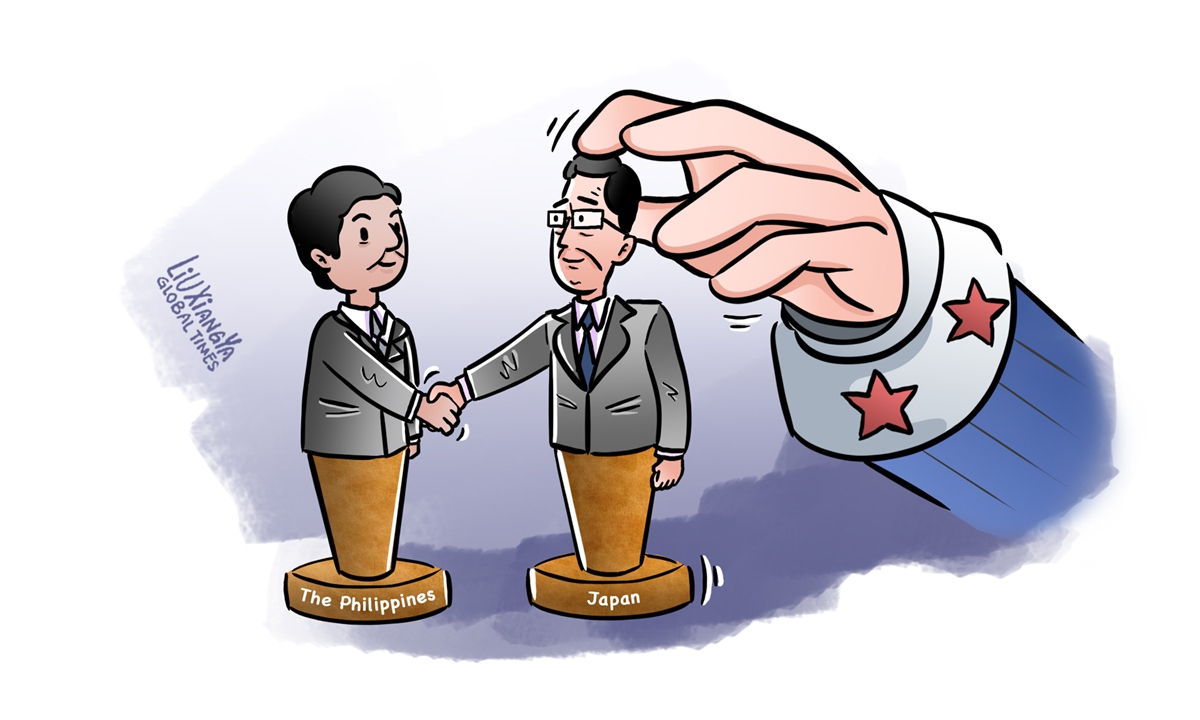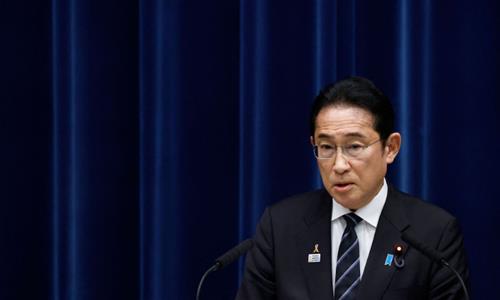
Illustration: Liu Xiangya/GT
Japanese Prime Minister Fumio Kishida is visiting the Philippines on Friday, where the two countries may begin negotiations for the Reciprocal Access Agreement (RAA). This move indicates that the Japan-Philippines security relationship is moving into "quasi-alliance," given that the RAA aims to simplify procedures to dispatch defense personnel, arms and ammunition to signatory countries. Amid the current complex and volatile security situation in East Asia, the Japan-Philippines security cooperation is far from a purely bilateral matter, and should be taken as a hazard to regional security.
For Japan, the signing of the RAA will make the Philippines its third "quasi-ally" regarding security, after Australia and the UK. This will allow Tokyo to further extend its military reach, constituting the latest step in Japan's efforts to break through the post-war military no-go zone. In addition to seeking to expand military spending and develop offensive military power, Japan is also actively strengthening defense and security cooperation with other countries, which is a more covert approach. This upgrading of defense cooperation with the Philippines will undoubtedly open a new channel for Japan in its military reach.
For the Philippines, defense cooperation with Japan is not only a way for Manila to seek military modernization, but also a bargaining chip in the South China Sea game. Since Ferdinand Romualdez Marcos came to power, the policies of his administration have emphasized the concern for "national security," and its stance on the South China Sea issue has become hard-line. Moreover, the Marcos administration has continuously incited nationalism in the Philippines. In the Philippines' latest National Security Policy, the South China Sea issue was positioned as a "primary national interest." The country's upgraded security cooperation with the US, Japan and Australia is intended to counterbalance China and help realize its territorial ambitions in the South China Sea relying on external forces.
From the view of Japan-Philippines security cooperation, it is clear their goal is to suppress China. Both states have territorial disputes with China, and the ruling authorities of both countries intend to use these issues to incite concerns over "external threats," and then implement populist policies to serve domestic political needs.
It is worth noting that the rapid upgrading of Japan-Philippines security relations is by no means an isolated phenomenon, behind which the "phantom" of the US is faintly discernible. Japan and the Philippines are both island countries on the edge of the Eurasian continent, which the US sees as important strategic pivots in the Asia-Pacific region. In Washington's layout of strategic competition with Beijing, Japan and the Philippines are key objects to rope in and seek support from because they are on the First Island Chain.
Furthermore, the trilateral security cooperation between the US, Japan and the Philippines is gradually taking shape. Washington and Tokyo seek to use Manila as a springboard to jointly intervene in Southeast Asian security affairs. They also continue to drive wedges between China and other regional countries, attempting to marginalize China's regional influence. However, with the strengthened military presence of the US, Japan and other non-regional countries in the South China Sea, the regional situation is likely to be affected by more external interference. Since the China-Philippines standoff in the South China Sea in August, the US has repeatedly declared that it defends the Philippines under the US-Philippines Mutual Defense Treaty, which fueled Manila's provocations against Beijing. Thus, the upgraded Japan-Philippines security cooperation can also be seen as coordination with the US' policy of containing China in the region.
It must be pointed out that the reason why ASEAN can achieve long-term development and play a central role in the Asia-Pacific region is by adhering to a diversified and balanced external strategy instead of taking sides among major powers. However, the US and Japan are trying to induce ASEAN countries to confront China on the South China Sea issue. In this regard, ASEAN countries generally hope to resolve disputes through dialogue and maintain peace and stability in the South China Sea.
On October 26, China and ASEAN countries held the 21st Senior Officials' Meeting on the Implementation of the Declaration on the Conduct of Parties in the South China Sea in Beijing. Against this backdrop, some ASEAN countries, for their own selfish interests, are jumping onto the war chariot created by the US and Japan to contain China and lead external forces into the South China Sea issue. This is tantamount to gambling on ASEAN's unity and stability and will only drag the bloc into the abyss of confrontation and geopolitical conflict. Regional countries should be alert to the negative spillover effects of Japan-Philippines security cooperation.
The author is a research fellow at the China Institute of International Studies. opinion@globaltimes.com.cn

